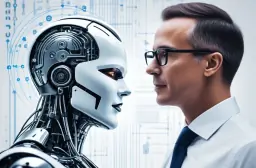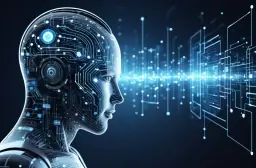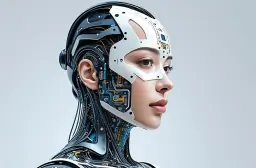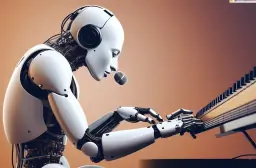How AI Transforms Daily Life: Smart Tech Innovation Unveiled
Table of Contents
Artificial Intelligence (AI) is not just a buzzword anymore; it is a part of our everyday lives, often without us even realizing it. From the moment we wake up and check our phones to the time we go to sleep, AI is making our routines smoother, faster, and more efficient. But how did we get here? How did a concept once reserved for science fiction evolve into something we now depend on for daily tasks?
Imagine waking up to a home that knows exactly what temperature you prefer, a coffee maker that starts brewing your favorite blend automatically, or an intelligent assistant that reminds you of your appointments. This is no longer the future; it is our reality today. In fact, the innovations we have witnessed in AI have revolutionized how we work, live, and interact with the world around us.
But what makes AI so transformative? Is it the seamless integration of smart devices? Or perhaps the way AI makes routine tasks faster and more efficient? What about the potential to personalize our experiences to the point that AI seems to know our needs even before we do? This article will dive deep into the AI applications that are transforming our daily life, from AI-powered household gadgets to intelligent personal assistants and beyond.
AI Integration in Our Daily Lives

AI has transitioned from being a futuristic concept to a powerful tool that influences nearly every aspect of our daily existence. The most visible examples of AI integration are the smart devices that surround us. Think about smartphones, voice assistants, and home automation systems—they have all become indispensable parts of our daily routines.
Smart Devices and Cognitive Computing
Smart devices have gained immense popularity due to their ability to make our lives more comfortable and convenient. These gadgets are powered by machine learning algorithms that analyze user behavior and adapt to individual preferences. For example, smart thermostats learn from your habits and adjust the home temperature accordingly, reducing energy consumption without any manual effort. Similarly, AI-driven refrigerators can suggest recipes based on the ingredients available inside, helping you plan your meals more efficiently.
- Voice assistants like Amazon’s Alexa and Google Assistant now control home systems such as lighting, security, and entertainment, making homes smarter and more interactive.
- AI-powered healthcare devices are also gaining ground, from smartwatches that track your heart rate to wearable devices that monitor your sleep patterns, offering personalized health insights.
Personalized Experience with AI
One of the most fascinating developments in AI is its ability to personalize experiences. AI-powered recommendation systems on platforms like YouTube, Netflix, or Amazon learn from user behavior and suggest content tailored to individual preferences.
- Predictive technology is now embedded in many apps, offering personalized suggestions for everything from shopping to entertainment, making interactions more intuitive and efficient.
AI in Household and Smart Home Systems
The integration of AI into household devices is one of the most tangible ways AI impacts our daily lives. Smart homes, powered by intelligent systems, are becoming the norm, where AI-driven solutions enhance comfort and security.
Automation of Household Tasks
From automated cleaning systems like robotic vacuum cleaners to AI-powered smart kitchens, automation has entered almost every corner of our homes. Imagine a system where your vacuum runs at scheduled times, or your washing machine adjusts its cycles based on the fabric type, all without human intervention.
Voice-Controlled Living
Voice-controlled virtual helpers are the backbone of modern smart homes. With devices like Amazon Echo or Google Home, household members can simply give voice commands to control everything from music to lights, to climate control. This level of convenience makes it clear that AI convenience is not just about saving time—it’s about enhancing quality of life.
- AI household devices are continuously evolving to understand complex commands and offer solutions that cater to your specific needs.
AI for Productivity and Efficiency

AI is not only making our lives easier at home but also improving our productivity at work and beyond. AI-powered tools are increasingly being used in various industries to streamline processes, automate repetitive tasks, and make data-driven decisions.
Machine Learning and Workflow Automation
AI’s ability to analyze vast amounts of data and provide insights in real-time is revolutionizing industries. For instance, AI-powered chatbots are now handling customer service inquiries, while machine learning is being used to predict trends and automate tasks in sectors like finance, healthcare, and marketing.
- Automated tasks like scheduling meetings, managing emails, and even drafting reports are helping employees save time and focus on more strategic activities.
AI-Powered Virtual Assistants
Virtual assistants like Siri, Google Assistant, and Cortana are now deeply integrated into business workflows. These tools can schedule meetings, send reminders, and provide valuable insights, all of which help businesses stay ahead in a competitive landscape.
- AI productivity tools are designed to optimize your workflow, reduce human error, and improve decision-making processes.
AI and Robotics in Daily Life
Robotics and AI go hand-in-hand when it comes to transforming our daily routines. AI-driven robotics is making waves in industries like healthcare, retail, and even personal assistants.
Autonomous Vehicles and Transportation
Autonomous vehicles are perhaps the most revolutionary application of AI in everyday life. While fully autonomous vehicles are still being developed, self-driving cars powered by AI are already on the road, offering a glimpse into the future of transportation. With AI for productivity, these vehicles promise to improve traffic flow, reduce accidents, and make commuting more efficient.
Robotics in Healthcare and Assistance
In healthcare, robotic surgery is becoming more common, helping doctors perform complex operations with greater precision. Additionally, robotic assistants are helping the elderly by offering assistance with daily activities, ensuring that they can live independently for longer periods.
- AI-powered robotics is also helping businesses streamline manufacturing processes, increasing speed and accuracy.
FAQs
How is AI used in everyday life?
AI is embedded in many aspects of daily life, including smart home systems, digital assistants, automated tasks, and AI-powered gadgets.
What are some examples of AI in everyday life?
Some examples include voice assistants, smart thermostats, automated home systems, and AI-driven personal assistants that handle tasks like scheduling and reminders.
How does AI make life more efficient?
AI makes life more efficient by automating repetitive tasks, providing personalized recommendations, and streamlining workflows in both personal and professional settings.
What is the future of AI in everyday life?
The future of AI in daily life involves even more advanced AI-powered systems, intelligent devices, and autonomous technology, all designed to further improve convenience, productivity, and efficiency.
Conclusion
AI has become a transformative force in our daily lives, from smart home systems that enhance convenience to AI-powered assistants that boost productivity. As AI continues to evolve, the line between automation and human intervention is becoming increasingly blurred. The future of daily life will undoubtedly be shaped by AI-driven solutions, intelligent systems, and predictive technology that make life more efficient, personalized, and convenient.
Key Takeaways:
- AI applications are integral to modern life, enhancing everything from personal productivity to home automation.
- Smart devices and virtual assistants are just the beginning of AI’s potential to transform daily life.
- The integration of AI-powered solutions into everyday tasks offers unparalleled convenience and efficiency.










